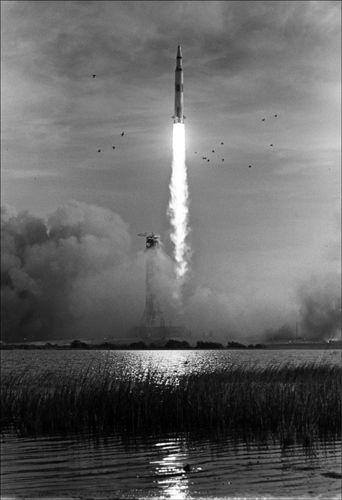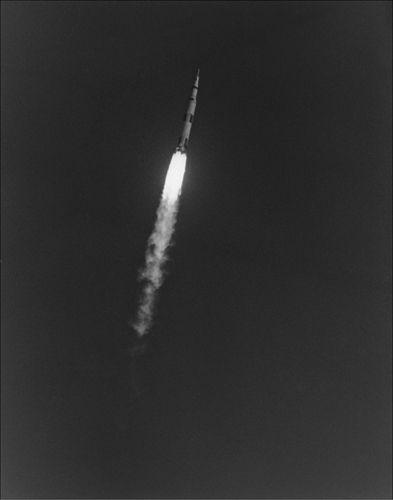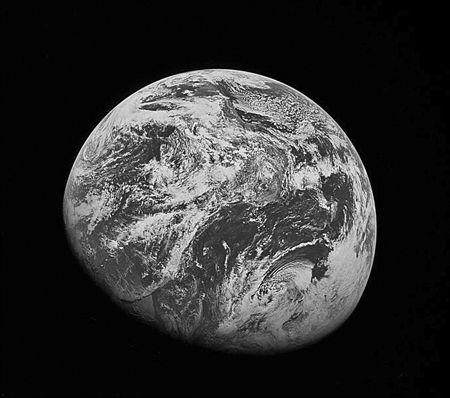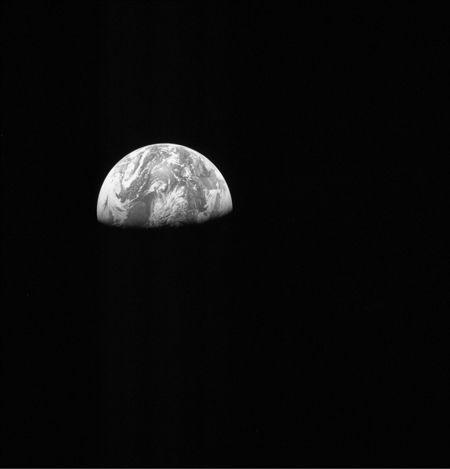Neil Armstrong: A Life of Flight (26 page)
Read Neil Armstrong: A Life of Flight Online
Authors: Jay Barbree
Tags: #Science, #Astronomy, #Biography & Autobiography, #Science & Technology


Apollo 8
’s Saturn V sends birds and wildlife fleeing. (NASA)
* * *
On board Frank Borman, Jim Lovell, and Bill Anders had just pushed through the region of maximum dynamic pressure, their spaceship leaving all sound behind. It was eerily quiet now. Had the astronauts not heard the humming of electronics, they might have thought they were in a simulator on the ground.
But they sure as hell weren’t.

Apollo 8
’s astronauts leaving for the moon. (NASA)
Something was slamming their growing weight back into their seats, hauling them faster and faster into space, and it was all working. By the time they neared the speed needed to orbit Earth they had burned and discarded the rocket’s first and second stages. Now all they needed was a push from its S4B third stage to begin circling Earth, which they got, and Mission Control began checking and rechecking all of
Apollo 8
’s systems again. They had to be as sure as possible it had survived the rigors of launch and its ride into orbit and all would be well for the farthest and the longest journey ever taken by humans.
The checks and tests lasted for nearly two Earth orbits.
Apollo 8
was set. The crew then fired the S4B stage again.
The final burst of energy from their Saturn V’s final stage increased the astronauts speed more than 7,000 miles per hour. The rocket burn was what space navigators called translunar insertion, and
Apollo 8
’s new speed of more than 24,000 miles per hour broke the grip of Earth’s gravity. The spaceship with a crew of three was free to cross the void to the moon. Shortly thereafter Jim Lovell sent a message back to Mission Control. “Tell Conrad he lost his record.”
Pete Conrad and Dick Gordon had reached a height of 739 nautical miles in their agile
Gemini 11
spacecraft. But
Apollo 8
was still climbing and when it was done the new record would be some 240,000 miles.
* * *
Inside Launch Control Neil had monitored every happening on board the moon-bound ship. But now it was time for him and the backup crew to get moving—back to Mission Control to witness
Apollo 8
become the first manned spacecraft to enter an orbit around the moon. He and Buzz and Fred with their wives boarded a NASA Gulfstream aircraft for the flight back to Houston. When home Neil showered, changed his clothes, and then drove to Mission Control to stand by if needed.
He was there in his capacity as
Apollo 8
’s backup commander. If any of the flight controllers needed to know what the crew was scheduled to be doing at any given moment, he was their man. Otherwise he took a stay-out-of-the-way seat in the big room full of consoles.
Deke Slayton saw Neil and thought this would be a good time to talk about his next assignment. He came over and pulled up a chair.
“Got a minute, Neil?”
“Sure, Boss, anytime.”
“Been thinking about your next assignment.”
“That’s great.”
“There’s lots of ifs, ands, and buts,” Deke said flatly, “but we’re thinking about you commanding
Apollo 11
.”
“That wouldn’t make me mad,” Neil grinned.
Deke leaned forward and in an almost whisper explained there was no way of knowing what
Apollo 11
’s mission would be. But, if
Apollo 8
’s current flight to orbit the moon was a success, if the lunar module could pass muster in its Earth-orbital first flight with
Apollo 9
, and if
Apollo 10
could return to lunar orbit and its lunar module could descend to within 8.4 miles of the moon, then
Apollo 11
could be the first to land.
Neil wasn’t easily stunned, but he was for a long moment. He just looked at the director of flight crew operations and processed everything he had been told. “Thanks Deke, thanks for your confidence,” he said offering him his hand. “If you decide to trust me with
Apollo 11
, you’ll get my best effort.”
“I know we will, Neil,” he assured him, adding, “It’s shaking out that way.”
* * *
Deke walked away and Neil reflected on the stunning possibility his crew just might be the first to set foot on a place other than Earth. But certainly not lost on Neil, despite what he’d just been told, was the fact that the marvelous product of science, technology, and engineering that would take him and his crew there was at this very moment moving between Earth and the moon—the Block II Apollo command module created from the ashes of
Apollo 1
. It was crammed with the knowledge learned from NASA’s astounding misjudgment.
The three astronauts riding within the cone-shaped, tiny world of their vessel were doing so under the watchful eyes of the largest audience in history. More than a billion were tuned to their radios and televisions receiving reports of sights never before seen.

For the first time humans were seeing the Earth as an almost full sphere. (NASA)
Live views from a receding Earth came into homes from the spaceship, and its crew played tour guide.
* * *
Meanwhile on the steppes of Kazakhstan Zond was left standing on its launchpad. Disappointment replaced the usual holiday round of vodka and cognac toasts.
Lev Kamanin, top aide to Kremlin space officials and the son of the chief of cosmonaut training, wrote in his diary: “For us this day is darkened with the realization of lost opportunities and with sadness that today the men flying to the moon are named Borman, Lovell, and Anders, and not Bykovsky, Popovich, or Leonov.”
No matter how well he said it, Kamanin’s sentiment was not the end of Russian efforts to reach the moon. Despite failures with their big rockets, the cosmonauts would continue to try.
* * *
The hours in
Apollo 8
’s flight clicked away—day one and now day two—but not the awe and wonder. Armstrong knew the astronauts were fascinated, unable to take their eyes off of what was out there. Suddenly they were aware of a distant sphere easing into view—a stunning view of Earth. Not vast horizons curving gently away, but a more than half-full Earth—a blue marble with dominating blue seas and white clouds, bountiful rain forests and mountains rising above its surface.
From midway between their home and the moon, Earth appeared to them as perfectly round, a stunning sphere, and
Apollo 8
rolled on with Earth sliding silently out of sight leaving the astronauts a universe that was for the first time on their trip totally dark. No more Earthglow, no more moonglow—even the sun had hidden itself—and Borman, Lovell, and Anders had the most clear, the most distinct view possible, of their own Milky Way and hundreds more galaxies with their nebulas and star clusters, some so bright and far away.
Tomorrow would be Christmas Eve. That Borman, Lovell, and Anders were approaching the moon seemed impossible. They had left Earth riding America’s largest rocket, the mightiest energy machine ever built to lift straight up and away from the deep gravitational well of their planet, a monster of steel and ice and fire atop which no man had ever before flown. And they were risking everything to fly into orbit around Earth’s natural satellite.

Apollo 8
’s astronauts saw this stunning view of Earth with white clouds and dominating blue seas. (NASA)
It was a gamble like few others known to history.
* * *
Apollo 8
slipped across the equigravisphere, that point in their flight where the moon’s gravity would have a greater pull than distant Earth. In Mission Control Neil and Deke Slayton grabbed some fresh coffee and lost themselves in one of the control center’s back rooms.
“Mike Collins has recovered well from his neck operation,” Deke began, “How would you feel about having Collins and Buzz Aldrin as your crew?”
“No problem,” Neil assured him. “I’ve been working these last months with Buzz on the backup crew for
Apollo 8
, and everything went well.”
“No problems?”
“None.”
“I could make Jim Lovell available.”
Neil was taken a bit aback. He was aware some had difficulty getting along with Buzz, but not him. And there were none better than Jim Lovell and Mike Collins and that begged the question, Which would fly which? Would Mike still be command module pilot and Jim land on the moon or would Lovell, the most experienced command module pilot in the corps, remain in that slot leaving Mike Collins to move over as lunar module pilot?
Neil asked Deke, “Isn’t Jim Lovell commander material?”
“Yes, definitely,” Deke agreed.
“I wouldn’t want to interfere with Jim commanding his own flight.”
“Understand—just wanted to give you options,” Deke told him. “Let’s both think about it overnight.”
“Good idea, Boss,” Neil nodded, quickly reminding himself that
experience
should be his chief consideration for a crew.
Buzz Aldrin had nailed the EVA thing in
Gemini 12
and Mike Collins was at the top of his game in flying the Apollo command module, but at this moment Jim Lovell was at the helm of
Apollo 8
’s command module.
Later, Neil would tell me, “If we switched things around too much, getting other people’s nose out of joint because we stole somebody from somebody else’s crew, we could have made enemies.
“And there were personalities—always personalities, and that’s one where I came up short,” Neil laughed, taking a good-natured jab at himself.
* * *
With the moon getting closer
Apollo 8
’s astronauts were waiting for Mission Control’s decision on whether or not they would slide into lunar orbit.
The three astronauts did not know if they would be spending Christmas circling the moon or making a single trip around its far side. Either way their flight was already a smashing success. It had opened the door to human exploration of our solar system, but, and it was a big but, everyone in NASA as well as the world’s billions in the radio and television audience wanted
Apollo 8
to go all the way.
